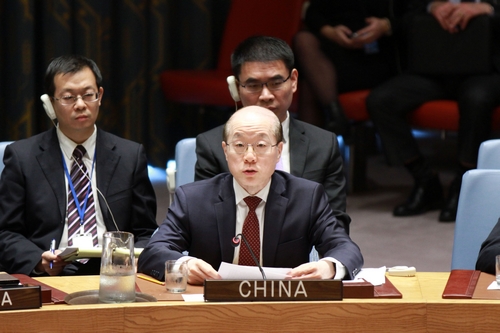| Statement by Ambassador LIU Jieyi at the Security Council Debate on Protection of Civilians and Medical Care in Armed Conflict |
| 2017-05-25 23:15 |
|
China commends Uruguay for taking the initiative to hold today’s open debate on the protection of civilians in armed conflict and specifically on the protection of civilians and medical care in armed conflict. China welcomes Foreign Minister Mr. Nin Novoa for coming to New York to preside over today’s meeting. I wish to thank Secretary-General Guterres for his briefing. China has listened carefully to the statements made respectively by Ms. Beerli, Vice-President of the International Committee of the Red Cross, and the representative of non-governmental organizations. At present, the security situation around the world remains grim. Hot spot issues in some areas gone unresolved for far too long, which have resulted in continuous armed conflict. The situation has put the growing insecurity of local civilians and their medical care into sharper focus. As such, this issue has attracted much attention from the international community. China supports the international community in taking robust actions to provide safety and security to civilians, medical workers and their facilities. First, focus must be placed on conflict prevention and resolution so as to eliminate the root causes that jeopardize the safety of civilians, medical workers and their facilities in the first place. Countries must foster a sense of building a community of shared future for mankind and promote a system of global governance based on joint consultations and contributions and shared benefits in order to build a peaceful and a stable international environment. Secretary-General Guterres has been actively campaigning for initiatives on conflict prevention and sustainable peace, which in our view is a valuable effort to achieve the aforementioned goal. The international community should, working with one mind, implement the 2030 Agenda for Sustainable Development and tackle the deep-rooted causes of conflict. At the same time, it is necessary to advocate a culture of peace and promote national reconciliation. As the core of the collective security mechanism, the Security Council should effectively shoulder its responsibility for maintaining international peace and security by working to promote dialogue and negotiation and sustaining efforts to find political solutions to hot spot issues, so as to keep civilians out of armed conflict as much as possible. Secondly, the Government and the parties to a conflict are duty-bound to protect the civilians. National Governments bear the primary responsibility when it comes to the protection of their civilians. Parties to conflict must respect international humanitarian law and implement all relevant resolutions of the Council, including resolution 2286 (2016); honor their obligation to protect civilians, medical workers and their facilities; and ensure that there is humanitarian access. With regard to the victims of armed conflict, it is incumbent on the Government and the communities concerned to protect their legal rights and dignity and help them to reintegrate into their communities. With regard to cases of violations of international humanitarian law in armed conflict, such as human rights violations, threats to and attacks on health-care personnel and facilities, national Governments must take action to investigate and punish the perpetrators. Thirdly, it is necessary to adopt a holistic approach and a working synergy. The civilian protection mandate embedded within United Nations peacekeeping operations, being an important means to protect civilians as it is, must strictly abide by the Council’s mandate and should not be seen as a replacement for the responsibility and obligation to protect civilians that fall to national Governments and the parties to the conflict. When designing a protection of civilians mandate, the Council should take into account to the overall condition and requirement of the host country and the capacity and the conditions of the peacekeeping missions so as to ensure that the relevant mandate is clear, practical and feasible. Peacekeepers who commit sexual exploitation and abuse must be firmly punished. Regional organizations, such as the African Union, and international humanitarian agencies have comparative advantages and a unique role, which must be fully utilized. Efforts must also be made to enhance information exchanges a policy alignment so as to help affected countries enhance their ability to protect civilians. In this connection, it is also important to have an effective strategy to cope with the refugee situation, help host countries resettle refugees and resolutely stamp down on criminal activities against refugees. Fourthly, we must do a good job of providing humanitarian assistance in armed conflict. China hereby pays tribute to all medical workers and humanitarian relief agencies for their humanitarian spirit in healing the wounded and rescuing the dying in armed conflict. We hope that, in carrying out their noble mission, they will abide by the purposes and principles of the Charter of the United Nations, observe the guiding principles of United Nations humanitarian assistance, respect the sovereignty and territorial integrity of the host country, make a special effort to win the understanding and trust of the parties concerned and avoid being themselves involved in the conflict. Such an approach is conducive to the safety and security of medical personnel, their facilities and the humanitarian workers operating in armed conflict. The United Nations should play its coordinating role, keep channels open with all parties to the conflict and strengthen its supervision of humanitarian workers and others involved so as to create conditions for timely and safe humanitarian access. |
| |||||||||||||
| |||||||||||||
